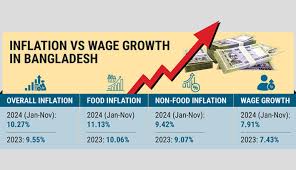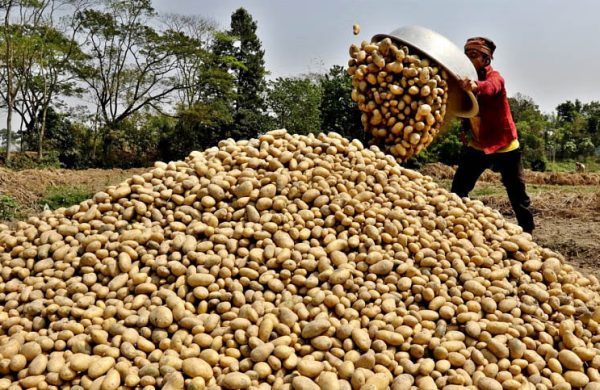Inflation pressure hit people hard
- Update Time : Monday, December 30, 2024

TDS Desk:
Inflation crisis has pushed millions into financial distress in the country in the outgoing year, with soaring food prices and stagnant incomes leaving families struggling to afford basic necessities.
Despite official claims of inflation control, recent data reveals a grimmer reality, with food inflation peaking at 14.10% in July 2024 – the highest in 16 years – making it one of the most challenging years for consumers.
Rafiqul Islam, a resident of Dhaka and part of a lower-middle-class family, exemplifies the daily struggles faced by ordinary citizens. Just months ago, Tk1,000 was sufficient for his family’s weekly groceries.
Now, it barely covers rice, lentils, and oil, let alone other essentials like potatoes, onions, eggs, and meat, which have witnessed dramatic price hikes.
Inflation pressure hit people hardIn 2024, the average inflation rate reached 10.27%, with food prices soaring by nearly 20%. Essential items like rice, oil, eggs, onions, garlic, and meat have seen significant price hikes, making food expenses much higher compared to 2023.
According to official statistics from the Bangladesh Bureau of Statistics (BBS) and the Trading Corporation of Bangladesh (TCB), the inflation rate initially appeared to be below 10%, but following the fall of the government, an interim administration revealed more accurate data, showing inflation had actually reached 11.66% in July.
Dr Zahid Hussain, former lead economist at the World Bank, stated, “While the previous government attempted to reduce inflation, these efforts were not successfully implemented. However, the new government is taking positive steps, and if these measures are executed properly, inflation can be reduced.”
During the tenure of former Bangladesh Bank Governor Abdur Rauf Talukdar, issues arose in the banking sector, and special privileges given to businesses exacerbated inflationary pressures, according to experts. As a result, the country’s non-performing loans increased, further harming the economy.
Official data shows that July recorded the highest inflation, with food inflation hitting 14.10%, the highest rate since the 2007-08 fiscal year. Consequently, the cost of living for ordinary people has become even more challenging, with limited income growth and rising expenses pushing many families into financial hardship.
Economists have warned that to address this crisis, the government must take more effective measures, such as strengthening market monitoring, resolving the dollar shortage, and implementing contractionary policies. Failure to do so will make life even harder for ordinary people, and inflationary pressures will continue to increase their suffering.
PRICES OUTPACE EARNINGS
Despite incremental wage increases, persistent inflation has become a silent enemy, eroding workers’ earnings year after year, according to economists. For the past 34 months, wage growth has consistently lagged behind inflation.
The latest data from the Bangladesh Bureau of Statistics (BBS) shows that inflation in November reached 11.38%, while wage growth was only 8.10%.
Since January 2021, the wage and inflation indices have moved in opposite directions. Inflation has remained above 9% for the past 19 months, peaking at 11.66% in July 2024 – the highest in 13 years.
Efforts are being made to ease inflation: Adviser
Planning Adviser Dr Wahiduddin Mahmud has stated that controlling inflation is currently the biggest challenge for the country.
He mentioned, “Reducing inflation is not easy, but efforts are being made to lower it somewhat.”
He cited the example of potato prices, saying, “For instance, the price of potatoes is very high, but if the price remains stable, inflation could become zero.”
He further stated that everyone’s focus should be on the government’s policy implementation regarding inflation and economic reforms.

















